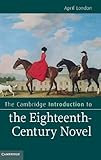The Cambridge introduction to the eighteenth-century novel / April London.
By: London, April.
Material type: BookSeries: Cambridge introductions to.Publisher: Cambridge ; New York : Cambridge University Press, 2012Description: vii, 250 pages ; 23 cm.ISBN: 9780521895354 (hardback); 9780521719674 (paperback).Subject(s): English fiction -- 18th century -- History and criticism | LITERARY CRITICISM / European / English, Irish, Scottish, WelshDDC classification: 823.509 Other classification: LIT004120 Online resources: Cover image
BookSeries: Cambridge introductions to.Publisher: Cambridge ; New York : Cambridge University Press, 2012Description: vii, 250 pages ; 23 cm.ISBN: 9780521895354 (hardback); 9780521719674 (paperback).Subject(s): English fiction -- 18th century -- History and criticism | LITERARY CRITICISM / European / English, Irish, Scottish, WelshDDC classification: 823.509 Other classification: LIT004120 Online resources: Cover image | Item type | Current location | Call number | Status | Date due | Barcode |
|---|---|---|---|---|---|
 Books
Books
|
Eastern University Library General Stacks | 823.509 LOC 2012 (Browse shelf) | Not For Loan | 14200 |
Includes bibliographical references (pages 227-233) and index.
Machine generated contents note: Introduction; Part I. Secrets and Singularity: 1. The power of singularity; 2. The virtue of singularity; 3. The punishment of singularity; Part II. Sociability and Community: 4. The reformation of family; 5. Alternative communities; 6. The sociability of books; Part III. History and Nation: 7. History, novel, and polemic; 8. Historical fiction and generational distance.
"In the eighteenth century, the novel became established as a popular literary form all over Europe. Britain proved an especially fertile ground, with Defoe, Fielding, Richardson and Burney as early exponents of the novel form. The Cambridge Introduction to the Eighteenth-Century Novel considers the development of the genre in its formative period in Britain. Rather than present its history as a linear progression, April London gives an original new structure to the field, organizing it through three broad thematic clusters - identity, community and history. Within each of these themes, she explores the central tensions of eighteenth-century fiction: between secrecy and communicativeness, independence and compliance, solitude and family, cosmopolitanism and nation-building. The reader will gain a thorough understanding of both prominent and lesser-known novels and novelists, key social and literary contexts, the tremendous formal variety of the early novel and its growth from a marginal to a culturally central genre"--


There are no comments for this item.